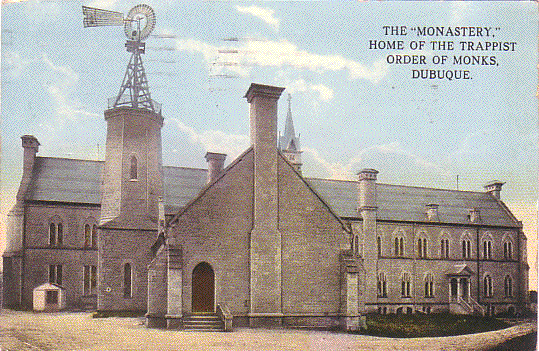Encyclopedia Dubuque
"Encyclopedia Dubuque is the online authority for all things Dubuque, written by the people who know the city best.”
Marshall Cohen—researcher and producer, CNN
Affiliated with the Local History Network of the State Historical Society of Iowa, and the Iowa Museum Association.
TRAPPISTS: Difference between revisions
(New page: TRAPPISTS. Irish monks, following the rules established by St. Benedict in 580 A.D., who settled southeast of Dubuque. As part of his efforts to encourage the Catholic settlement of the Mi...) |
No edit summary |
||
| Line 1: | Line 1: | ||
TRAPPISTS. Irish monks, following the rules established by St. Benedict in 580 A.D., who settled southeast of Dubuque. As part of his efforts to encourage the Catholic settlement of the Midwest, Bishop [[LORAS, Mathias|Mathias LORAS]] traveled to Ireland and to the monastery in County Waterford. | [[Image:trappists.gif|left|thumb|350px|Andrew Carnegie]]TRAPPISTS. Irish monks, following the rules established by St. Benedict in 580 A.D., who generations later settled southeast of Dubuque. As part of his efforts to encourage the Catholic settlement of the Midwest, Bishop [[LORAS, Mathias|Mathias LORAS]] traveled to Ireland and to the monastery in County Waterford. | ||
The monastery was called "Melleray on the Mount." "Melleray" a name derived from "mel," a word for honey, suggested the site was a place of honey. The monks belonged to the Trappist Order were among the many people suffering the famine of 1847. Suffering persecution for seven hundred years, the monks found promise | The monastery was called "Melleray on the Mount." "Melleray" a name derived from "mel," a word for honey, suggested the site was a place of honey. The monks belonged to the Trappist Order were among the many people suffering the famine of 1847. Suffering persecution for seven hundred years, the monks found promise Loras' description of a new land with so many Irish settlers nearby. Sixteen monks left "Melleray on the Mount" on July 16, 1849. Six died of [[CHOLERA]] as they journeyed north on the [[MISSISSIPPI RIVER]]. | ||
The first ordination to the priesthood was held at the New Melleray Trappist Monastery on April I, 1933. Frater Pius Hanley, OCSO, was ordained by Archbishop [[BECKMAN, Francis J.|Francis J. BECKMAN]]. Following World War II the number of monks at the monastery rose substantially from an estimated twenty to over one hundred. (Photo Courtesy: http://www.dubuquepostcards.com) | The first ordination to the priesthood was held at the New Melleray Trappist Monastery on April I, 1933. Frater Pius Hanley, OCSO, was ordained by Archbishop [[BECKMAN, Francis J.|Francis J. BECKMAN]]. Following World War II the number of monks at the monastery rose substantially from an estimated twenty to over one hundred. (Photo Courtesy: http://www.dubuquepostcards.com) | ||
Revision as of 02:08, 4 August 2008
TRAPPISTS. Irish monks, following the rules established by St. Benedict in 580 A.D., who generations later settled southeast of Dubuque. As part of his efforts to encourage the Catholic settlement of the Midwest, Bishop Mathias LORAS traveled to Ireland and to the monastery in County Waterford.
The monastery was called "Melleray on the Mount." "Melleray" a name derived from "mel," a word for honey, suggested the site was a place of honey. The monks belonged to the Trappist Order were among the many people suffering the famine of 1847. Suffering persecution for seven hundred years, the monks found promise Loras' description of a new land with so many Irish settlers nearby. Sixteen monks left "Melleray on the Mount" on July 16, 1849. Six died of CHOLERA as they journeyed north on the MISSISSIPPI RIVER.
The first ordination to the priesthood was held at the New Melleray Trappist Monastery on April I, 1933. Frater Pius Hanley, OCSO, was ordained by Archbishop Francis J. BECKMAN. Following World War II the number of monks at the monastery rose substantially from an estimated twenty to over one hundred. (Photo Courtesy: http://www.dubuquepostcards.com)


